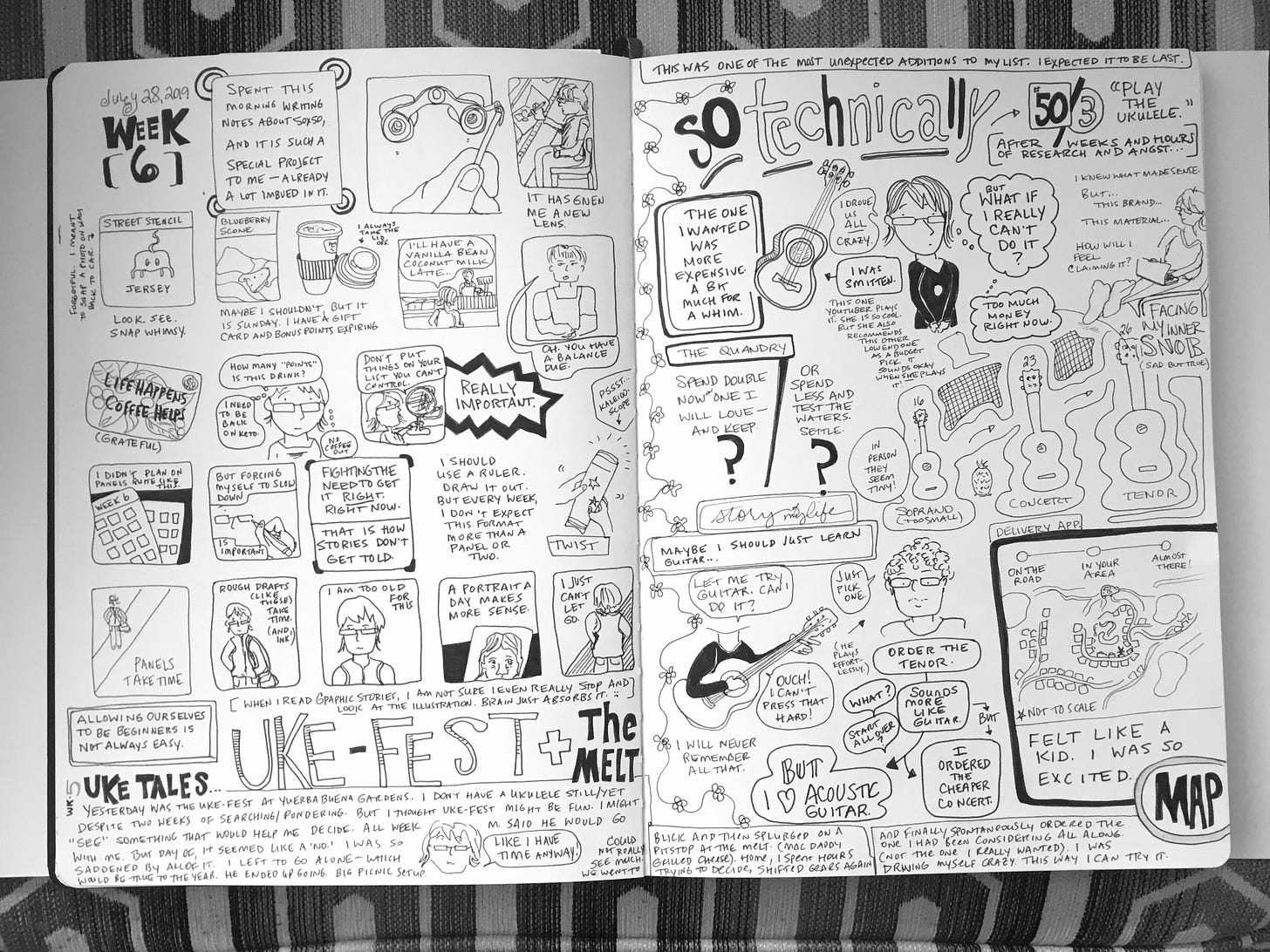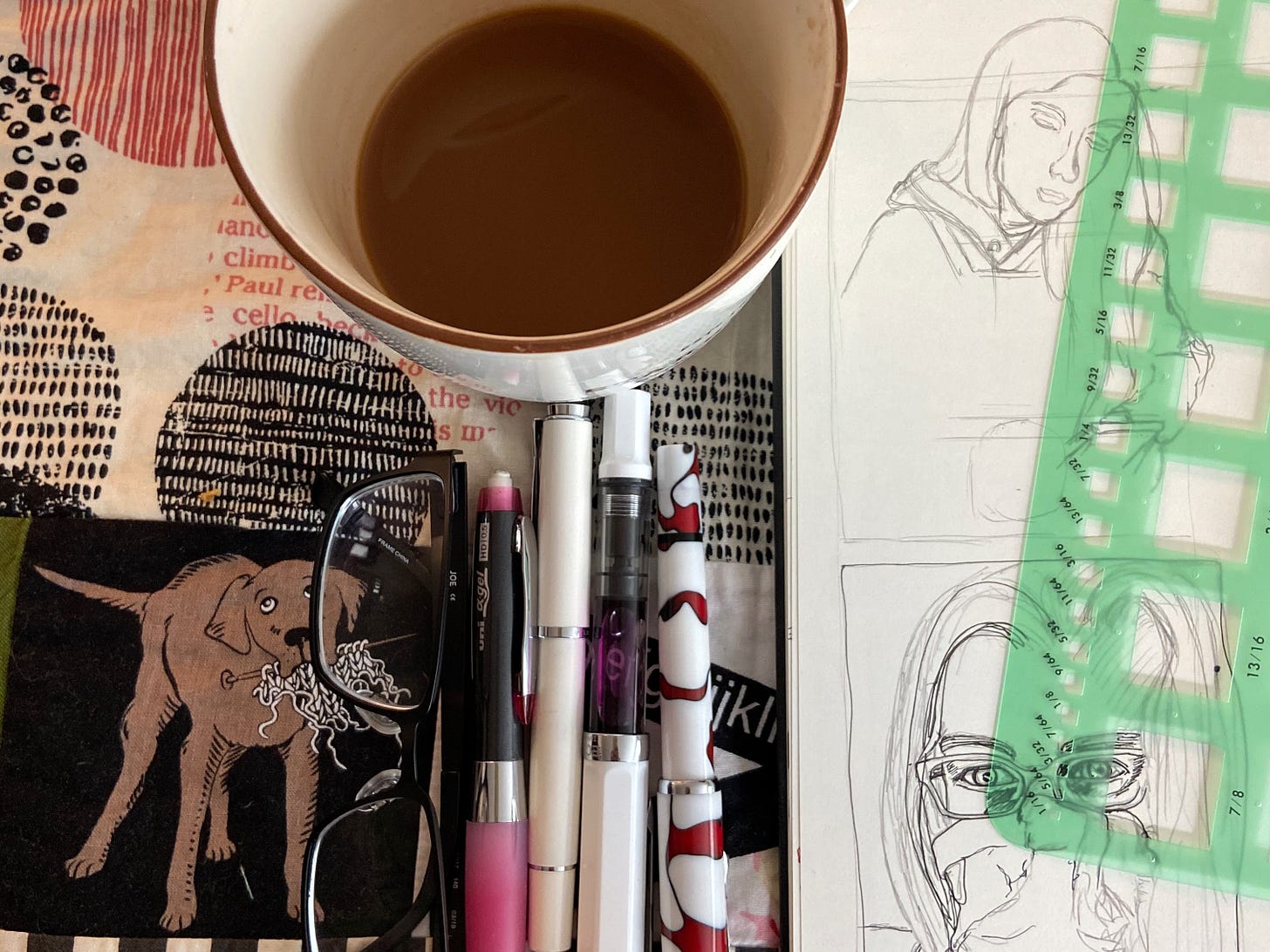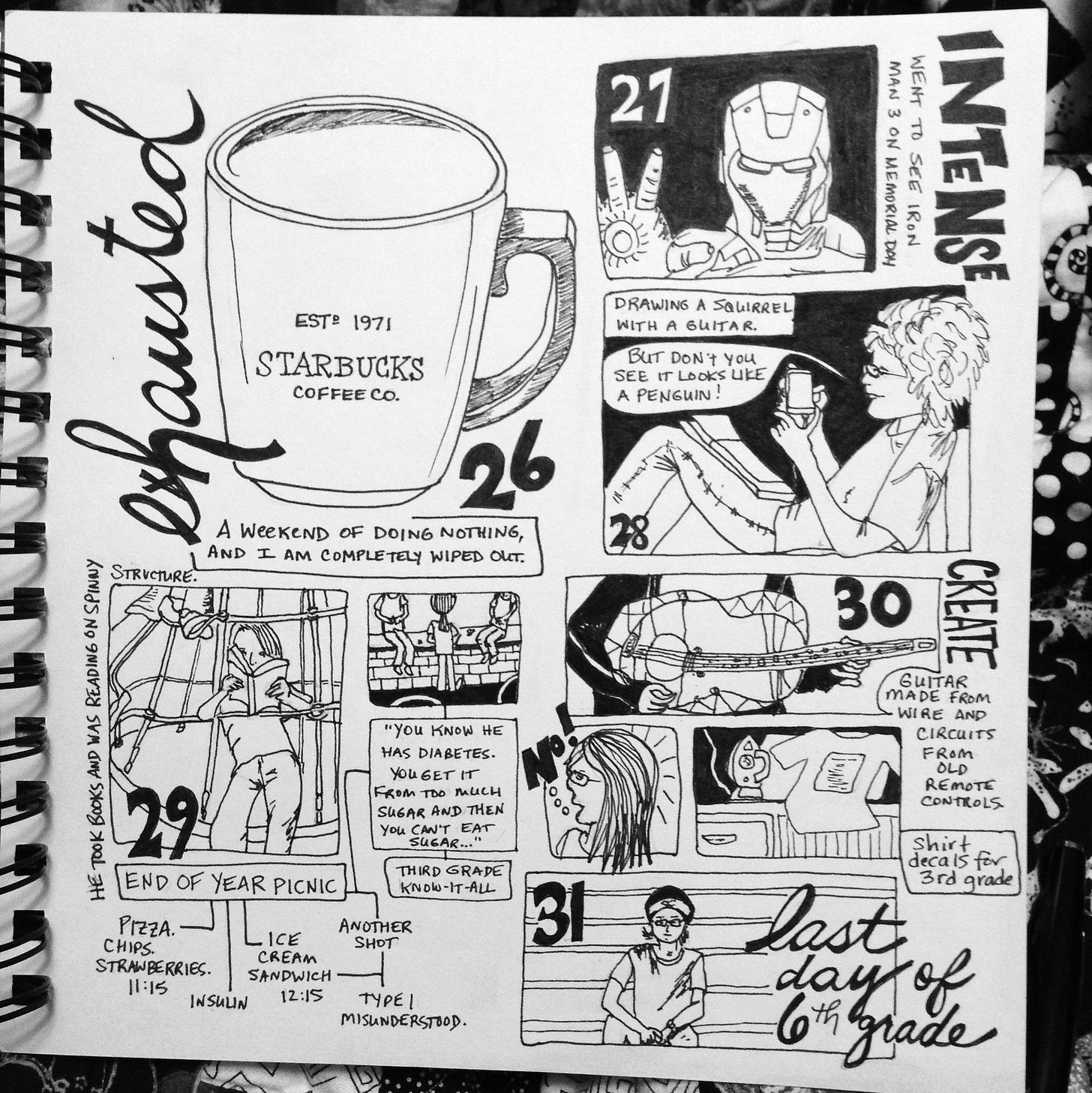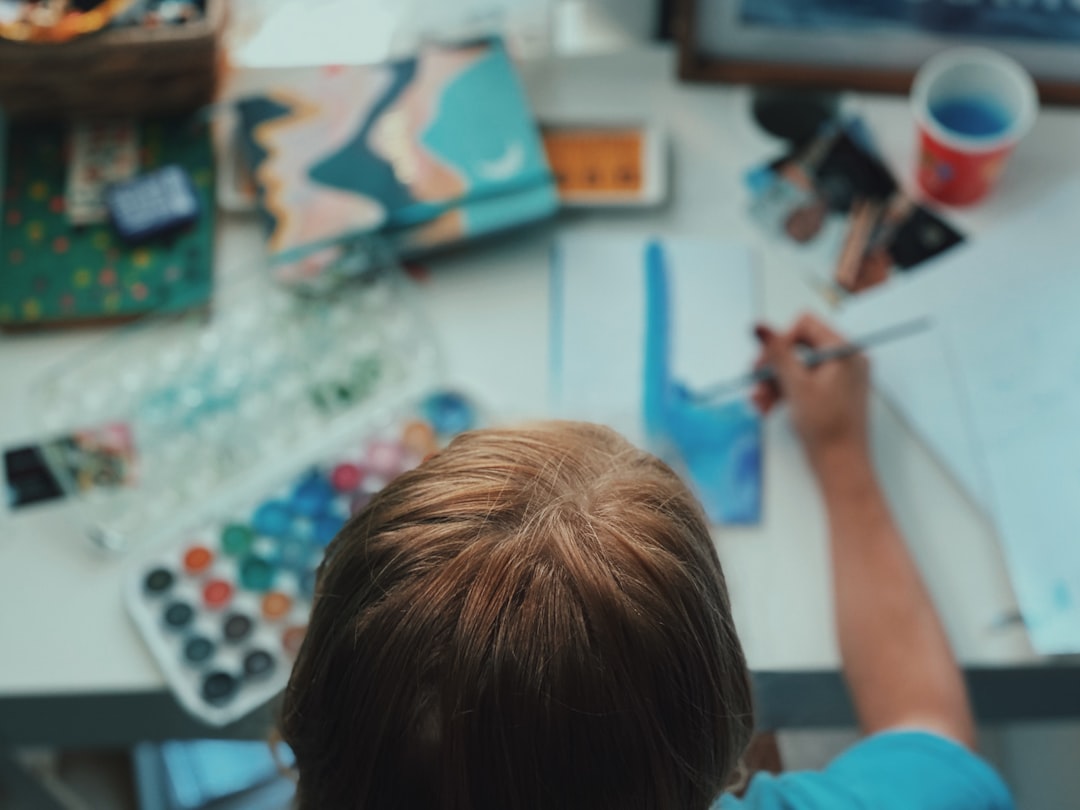Practice Makes.... ?
Thoughts on the value of practice and repetition in response to a "practice perfect" mentality that rankles
Happy Sunday!
Once again, I think my typical “make it all happen” day might be a day spent in the final stages of this transition time. I imagine instead of reading and rereading my words and lines a hundred times, erasing, replacing, adding, and endlessly spinning, I’ll be helping assemble a cheap desk and hoping the holes all line up (despite the Amazon reviews), maybe doing a grocery run, and then heading home, alone, as we move into this new season. Maybe it will end up a day different on one side or the other, but I am thinking ahead.
Saturday morning: the plan changed. I’m leaving things written as they are, there is always something asynchronous to the timing of words.
That I could make a pitstop at a Sonic along the way is the silver lining for the drive home. I'm so very predictable. How many times in the last four years did I draw the basic shape of a Rt. 44 Sonic cup in my illustrated journal as a way to mark a drive to drop off or pick up? In four years, one of which was at home during the pandemic, there really weren’t all that many trips. I expect they will be few and far between now.
Library sit, Thursday night: My stack tonight is full of gems from reserve and a few I found on the shelves. From my holds: How to Say Goodbye (Wendy MacNaughton), You Better Be Lightning (Andrea Gibson), Look Again: A Memoir (Elizabeth A. Trembley). I had digital things come in this week, too, including Fourth Wing (Rebecca Yarros) and Tom Lake (Ann Patchett). I need more time—and more focus!
Pre-library sit, Thursday night: I walked up and down the block twice after parking. It isn’t enough, but it’s more than most days. Since I come prepared for a two-hour sit and possible write-time, I worry about leaving my things in the car to walk around the block. The city has changed. Up and back, up and back, and there were roses in various stages of dying next to the houses I passed, yellow and peach and lavender. I am grateful to have looked.
Friday morning: Sitting sideways on the couch, iPad propped on my pillow, portable keyboard on the case edge, coffee wedged in the crook of my folded knee. It is foggy outside, heavy, a gradually brightening gray-white. I find myself starting at the top, reading, and adding, perpetually adding. I write at times like an endless scroll that just keeps unfolding. This seems to be the problem. Instead of working through the notes below that were written days ago, I just keep adding to the top, diluting the focus, meandering, throwing in a red herring here and there.
Today… a short stint on practice…. This isn’t really the routine “practice is good for you” piece you might expect. That is part of it, but there is an ear worm here, one I am trying to muddle through and clear: Practice perfect.
Wednesday morning, reflection: It was dark when I woke today. How did the morning light change so suddenly and dramatically without me noticing?
Quotes for the week:
“Do or do not. There is no try.” — Yoda
“I know you’ve heard it a thousand times before. But it’s true – hard work pays off. If you want to be good, you have to practice, practice, practice. If you don’t love something, then don’t do it.” — Ray Bradbury
“To practice any art, no matter how well or badly, is a way to make your soul grow. So do it.” — Kurt Vonnegut
“Never do anything by halves if you want to get away with it. Be outrageous. Go the whole hog. Make sure everything you do is so completely crazy it's unbelievable...” — Matilda
It's All Good if You Enjoy It
First, a reminder that whatever you choose to do, whatever the form or medium or project is that you choose to devote time to, try to enjoy the process.
This isn’t a trite or superficial wish.
I occasionally see people make fun of those who talk about enjoying the journey. Really, I think that’s what it’s all about. Enjoying the journey is an important underpinning, for me, of a creative practice that is mindful and balancing. If I wasn’t enjoying drawing each night (or how it makes me feel), I would stop. If I wasn’t enjoying this weekly writing space and all the hours through the week and on Saturday that I am putting into it for a handful of readers, I would stop.
We only have so much time. As much as possible, we should love what we do, especially when it comes to our hobbies, our arts, our passion projects.
We learn and grow through practice, but if we enjoy the act of doing (as well as the result, even in fledgling states), the process has meaning — regardless of whether we ever approach perfect.
One of the things I love most about keeping an illustrated journal or some kind of catch-all sketchbook is that the pressure is off to create a finished standalone page. The pressure is off to create something perfect. Sure, I like it when drawings go well or noses are properly in the center of faces or glasses appear reasonably proportioned with just the right amount of wonky. I like it when ears make sense, when eyes appear to look in the right direction (and in the same direction!), and when a portrait seems to capture the mood I’m trying to convey. I like it when I hear the portrait saying something, talking back from the page to the world at large in response to the week. I really like that.
I am okay with some wonk. What matters most to me is putting in the time, maintaining the habit (because habits can slide really easily), and filling space. I like to really fill the space.
In the end, I’m not going to hang pages on a wall. Only a few people will ever see even the photo I share (thanks, algorithm). Only a few people will comment (or maybe no one will). There won’t be deep discussions of each little vignette. I won’t be standing on a stage holding up my pages. (Even if I make a short video, it will probably be sped up a few thousand times.)
For so many of us, no matter what our aspirations, the doing and making and continuing is personal. We have to have our reasons. We have to at least peripherally have a why. We have to value the process and whatever it offers.
When people can’t get past their desire to create art at a certain level overnight, I always stress the value of repetition. That’s how we get better.
I’ve tried a few things that I wanted to get better at, but I didn’t enjoy the process as much as I do other things (like portraits). I put things aside, shed tasks and challenges, drop baggage along the roadside. It’s okay to focus, to pick and choose. It’s okay to circle back later and try again, see if another time is the right time.
It’s okay to lighten the mental load, to stick with your sweet spot, that comfortable, maybe glimmer-filled spot you most enjoy.
I talk a lot about repetition. Repetition, in our art, is a form of practice. Showing up again and again at the page, ready to make a mark, draw a person, illustrate a scene, is a form of practice.

Slow Progress on Guitar
Frustrated with what feels like my lack of improvement (keeping in mind I started sometime in June), I decided to go all the way back to basics and follow a popular video series from the beginning. (Well, sort of. I started with the second module. I just couldn’t imagine sitting through the first hour or so of basics.)
Friday night, near midnight: I’m rethinking that decision. I think I’ll check out the first module.
Since I sort of jumped in midstream with how I have been learning this summer, skipping strumming entirely and focusing on fingerstyle, I figured maybe backtracking for some core grounding was in order.
Don’t worry, I’m not going to fill the page again with guitar observations, even as they might relate to growth in our art. (I did that already.) But when I was watching one of the beginner videos this week, I heard something that stopped me in my tracks.
Practice doesn’t make perfect. Practice makes permanent.
I stopped, fascinated.
Practice doesn’t make perfect. Practice makes permanent.
How have I never heard it this way before? Poking around, I see that this philosophy is out there. It’s everywhere.
Somehow, it felt like a glass of cold water being thrown in my face. I froze. My heart hurt.
Is it wrong? Why does it stress me out every time I hear it in my head?
I completely understand the sentiment. The rational part of me gets it. If you are doing this or that wrong, you will likely build a bad habit that will be hard to correct later and might even hinder your progress.
It makes sense. It can be really hard to unlearn a habit.
On the flip side, sometimes you simply can’t do something exactly right from the beginning because .... well.... you're a beginner. I’m still working on getting enough flexibility in my old hands for some (most) of the reaches. I still can’t successfully do an F barre chord, even though I keep trying, over and over. That one isn't a shocker, but there are other, simple stretches across even three frets that I find hard. My hands just don't have the flexibility they might have had twenty or thirty or, help me, forty years ago. There isn't a whole lot of "perfect" happening when I practice.
But isn't that the point of practice?
Practice, I always thought, is how we build skill, how we get comfortable and familiar with movements, processes, and techniques. Practice builds muscle memory. It’s how we improve. It’s how we grow.
Practice doesn’t make perfect. Practice makes permanent.
I sat there, listening to this instructor go on to say, don’t just practice, “practice perfect.”
It was really thought-provoking. Is putting in the time enough to bring about change? Or is putting in the time potentially a waste of time if you aren’t doing it “perfectly” to begin with.
I sure hope not.
I do understand the thought, but the perfectionist in me is also stepping back and away with exaggerated motions, hands up. I don't want this mindset. I know my perfectionist tendencies often get in the way. (I've been trying to make better patterns even in writing these posts so that I am not editing and editing and overediting until the last possible second each week.)
Saturday morning, with coffee: I’m still writing from the couch and almost ready to move to my computer. I’m not getting better at letting these go. I keep trying.
I think I’ve spent the last few years trying to relax into something more mindful, something deliberately less worried about perfection. I moved away from daily finished pieces. I simplified. I created a “week” container to build in space and time, a comfortable, rolling, week-at-a-time, kitchen sink approach. I don't know that I've been overly successful, but I think my attempts at slowing down and trying to be more flexible have played out in my projects, in some of the choices I've made. Probably some of the projects that I've dropped or left wayside might have been left to fade away because they struck my perfectionist chord too strongly. Sometimes it’s just lack of time, but sometimes letting go has a lot to do with how a project or process feels.
Saturday night, late: Doing a final read, and I’ve deleted large sections and relocated others. I’m second guessing this one.
The Value of Repetition
When I heard practice makes permanent and practice perfect, I thought about guitar, yes, but also art.
I thought about art and the simple fact that most of us believe, pretty strongly, that practice brings improvement. I don’t know that I think we reach perfect or that perfect is even the goal.
Saturday morning, couch: What is perfect? Every time I read even this set of words, I change things here and there, little words, phrasings, flow. I continue to add things. I continue to evolve what I am trying to say and the connections I am trying to draw. I don’t know that I believe in end-points. I think there are just stopping points. We declare things done. But could they continue to be changed? Of course.
What I do know is that the portraits I draw today look better than the ones I drew when I first decided to try portraits six or seven years ago. I know there were lots of problems with my early efforts. The eyes were odd. There was a squareness to the jaws. Everyone looked slightly as if they came from some future dystopian land. There was something hard-edged.
I see all that now. I think our brains somehow protect us from seeing too clearly until later. We might know things are wonky, but something overall is satisfying, good enough. So we draw another. And another. And another.
In that process, we improve. I take that as a given. With repetition, we improve. We get better.
How does that happen though? With no corrective measures, no teacher stepping in to adjust our lines or point out the wonky angles or the better way to deal with a nose or how to add shadow, how do we improve? How is it that we can look back at a continuum of our own work, scroll our feed, and see clear differences along the way, clear (even if subtle) signs of improvement?
Practice.... makes a habit.
Maybe we can talk about muscle memory. Maybe we can talk about doing something again, trying again, trying with intention. “This time the nostrils won’t look like a pig.”
I think that the practice I do every single day when it comes to drawing is a step forward, a forward movement that wouldn’t happen if I didn’t make the time to draw and draw again. Every portrait adds something or at least reinforces and maintains something. I believe that. I hope that.
I don't think the problems become so ingrained that they are permanent.
Keep Showing Up
I don’t know that we think of “practice” in our art in the same way as, for example, with a musical instrument. The mechanics really are different. We don’t sit down and do some combination of running through scales or stretches and then playing bits and pieces, trying to decipher something new, and maybe playing something familiar, again, for the repetition. Practice takes a different shape, depending on the form or medium, but it is worth thinking about the value of practice, and repetition is part of practice. With repetition, we build familiarity and muscle memory.
I have counseled many people through the years to just "keep doing it." People often get frustrated when they start something. They want to be "good" right away. I always say that as long as they enjoy the process and keep showing up, they will improve. They have to keep doing it, keep practicing. It's fundamentally important though that they enjoy whatever it is enough to make that process make sense because skill doesn't happen overnight. It can take a long time, a lot of drawings, a lot of bad or wonky drawings, before you start seeing what you are hoping to see on the page.
Practice makes a habit.
Practice builds skill.
I do hope these things are true.
Even in guitar, I think practice is building skill, and I can't worry about practicing perfect. It's counterintuitive to think you have to already have "perfect" skill to build or learn a skill. I suppose we are to think, instead, that the goal is to practice “what would be” perfect. To the extent that that means practicing with intention, being deliberate, slowing down to try and build skills, it makes sense. I think I’ll still leave “perfect” out of the equation for myself when it comes to practicing.
I don’t need the pressure.
I’m not trying to be perfect. I just want to play and enjoy the process of playing. I want to be able to play a song that sounds somewhat recognizable, even if slow. I want to play with fewer mistakes, better memory, better reach, better timing. In the face of so much to learn, I keep picking up the guitar and practicing.
I heard something else about practice this week that also struck me as really important. Maybe we'll talk about it next week.
I hope you'll go and practice something today. Don't worry about being perfect. Just put in a few minutes of intentional effort. For most of us working on personal projects, that can be as simple as going and working in your journal or sketchbook for a bit. We move our projects forward even as we continue to practice our art (and strengthen our habit).
I think with a project like the illustrated journal, the practice is also the project.
If I let go of belief in practice and the value of repetition, I think all might be lost.
Hey, I keep hoping that as I write posts each week, I'll find the right balance, the right chord, the right refrain. I do keep hoping.
Made It?
Thank you for reading along!
If you are a Sonic person, what’s your go-to drink? (Some of you have told me before, but this is an easy one.)
Graffiti, sparkles, ornaments, black bird.
I was thinking of this random word section for you, and those words came to mind, along with trash truck (because I hear the truck on the street).
Your thoughts on the post are always welcome, but I also appreciate and enjoy the wonderful snippets of poetry that are happening in the comments. It lets me know you were here and that all of this time isn’t really just spinning into the ether.
If you would like to play along, comment:
Graffiti if you ever drew on the walls
Sparkles, dominoes, or melting, whichever seems right after reading this
Favorite Beatles song (if you have one)
Ghost if you battle a perfectionist streak
What are you “practicing” right now in your life?
Feel free to rearrange, embellish, and add your own flair and whimsy.
Illustrate Your Week — Week 38
The new prompts for Week 38 have been posted.
Also Posted This Week
Inspiring Words from Other Writers:
“The in-between of the seasons, like many transitions, can be magical if we allow it to unfold without holding on too tightly to what we’re losing or wishing too hard for what what’s to come.” – Charlene Storey, Haver & Sparrow
“I ask the Universe to keep me on track while I merrily go off the rails. The way out and back is long and full of surprises, strange switchbacks, tasty morsels. Morsels, like crumbs left to mark a trail. . . . What does it matter if the birds eat the crumbs? It is so glorious to be lost.” – Fran Gardner, Becoming
“So much about being an artist finding their footing in the world is the full-on too-muchness of it all sometimes. We’re out here on the periphery creating work with the hopes others will not only see what we’ve done but also understand its value. As in, hoping someone understands that the work that goes into writing and making art is a lifetime of study, practice, overthinking and sacrifice, beauty and glory.” – The Art of Repair, Deborah A. Stein (Read the whole post and essay on glitter.)
Congratulations to DishKitty on the 1-year mark of posting Trish Tales, her daily web comic.
Library sit, Thursday night: I just looked through Graffiti Alphabets: Street Fonts from Around the World (Claudia Walde). It caught my eye as I scanned the teen shelves. It’s a big book. I won’t be taking it home, but I enjoyed the quick flip. Mostly, I think my brain melted. The art is wonderful and fluid and bold and so often almost tessellated in the way the shapes fill space. My brain melted looking at alphabets and knowing that I would never sort them out into letters. I flipped through the pages feeling clueless and old. It’s a fascinating form. If you’re into graffiti, check it out. It’s full of examples from graffiti artists around the world — 154 artists, 30 countries.
The chairs around me have emptied. Now that school is back in session, I keep landing here with pairs of high school students in various stages of some flirtatious form of studying that is intriguing and a bit bizarre. I halfway overhear, catching snippets of conversation, lilts in voices, laughter, the interjection of life and timelines and social things scattered around bio or chem facts. As the two tonight left, the chairs were empty until someone else sat right next to me, forcing me to pull my mask back up.
Thank you for reading the Illustrated Life substack. Please consider subscribing (for free) to receive the weekly email. Writers need readers, and I am grateful for every reader! Please comment and share with someone else who might enjoy it.
Paid options are available for those who can and want to support the substack, the podcast, and #illustrateyourweek. I am trying to keep things free because I don’t want to shut people out who genuinely can’t afford a subscription model. But there are realities to this project, the work involved, my life, and how much hope I am pinning on this space. Subscriptions not your thing? One-time donations are also appreciated.
(Links to books or tools referenced in posts are Amazon affiliate links. Always check your library.)
Note: Wendy MacNaughton and Andrea Gibson both have substacks. Andrea was recently named Colorado’s new Poet Laureate and did a beautiful writeup.








I don’t have a word to drop. You wrote like a dragonfly this week, flitting from idea to idea. I havw too much to read, always, but I take time for you.
Graffiti, sparkles, Let it Be. Practicing gentleness toward myself as I stumble slowly toward my goals, and sometimes slip backwards away from them.